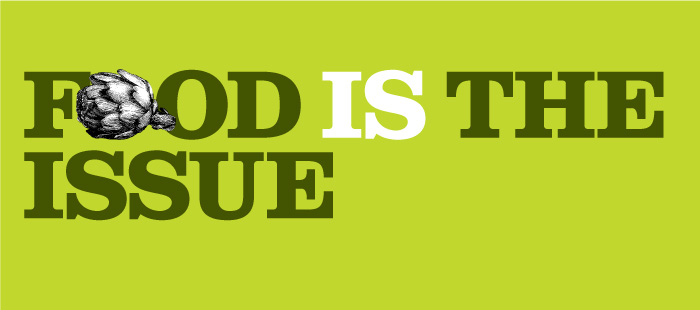title="Return to Table of Contents">Oberlin Alumni Magazine
Spring 2013 Vol. 108 No. 2

The communion of eating is well-tread territory. It is broadly accepted that there is something almost sacred about breaking bread with one another. Plenty of magazines and books—and a television network or two—are devoted to
food as a luxurious, sensuous experience. Chefs are the newest celebrities.
But lately something else has been going on. The New Yorker and the New York Times Magazine both started publishing annual food issues in 2007. Given New York's role as a capital of foodie culture (and home to a number of Oberlin alumni-run enterprises), maybe that's not surprising. But a broader dynamic is at work when the Times moves columnist Mark Bittman, author of How to Cook Everything, from its dining section to its editorial pages, and the Nation, Foreign Policy, and the Public Historian create their own special issues devoted to food. (Suffice it to say these sterner journals didn't serve up a lot of five-star restaurant reviews or tips for perfect pesto—though the Public Historian did offer a taste of New York in an article by Tenement Museum food tour guide Adam Steinberg '94.) We present this special issue on food because food is an issue—where it comes from and how, who gets it, and how it gets there.
While the TV show Portlandia may satirize the preciousness associated with a certain kind of food consumption—the micro, local, slow, hand-crafted, organic, free-rangeness of it all—the humor obscures the fact that food is, in fact, precious; that access to healthy food isn't as broad as it should be; and that a range of environmental issues, from growth hormones to global warming, megastores to sprawl, will play a role in access to food in the future. Not to mention that the terms micro, local, slow, hand-crafted, organic, and free-range address legitimate issues in the food chain.
The owners of the Pittsburgh restaurant Legume, Sarah '99 and Trevett Hooper '98, have made decisions from the start with an eye toward long-term sustainability over short-term profit. But they're not easy decisions.
"There are questions like, 'Should I buy carrots from the fourth-generation conventional family farm that has been at the same farmers' market in a poor neighborhood of the city every Saturday for the last four decades, or should I buy baby carrots from the organic farmer who specializes in gourmet vegetables for a high-end market?'" says Trevett. "Both are important, but for very different reasons."
His conclusion: "I have come to view food choices as existing somewhere on a spectrum, rather than trying to figure out what is 'good' or 'bad.'"
Of course, public policy at every level plays a role in deciding what those choices are. Many healthcare professionals, like University of Washington Associate Professor of Medicine Michael Ryan '82, blame a portion of America's health problems on federal farm subsidies that encourage production of unhealthy products like high fructose corn syrup. The Ohio Department of Agriculture's Office of Sustainability was shut down one week into a new administration; its director, Shoshanah Inwood '99, was escorted out. The department then initiated a new marketing program: "Ohio Means Agribusiness."
Oberlin seems uniquely positioned to address the issues surrounding food. For more than six decades, the Oberlin Student Cooperative Association has fostered student interest in food preparation. For nearly two decades, and with the help of people like Professor David Orr and food activist and filmmaker Brad Masi '93, the emphasis on environmental issues has shifted the co-ops and college dining toward greater sustainability through ever-increasing local sourcing, recycling, and composting, among other innovations. That interest has followed many students after graduation and into professions related to food: Some make pies, some make policy, and some try to do both. And in the months since we set out to prepare this special issue, we've been overwhelmed by the quantity and the quality of their efforts. We've included many here, but inevitably, we had to leave many out as well.
In the coming months, the Oberlin Alumni Magazine will augment the information in these pages with an online component that will include a recipe book and a comprehensive directory of alumni enterprises related to food. Alumni will be able to put together a map—much like the one of New York City in this issue—of all the alumni working in food in a given region so that if you're living there or visiting, you can support their enterprises.
The issue of food is, we know, much bigger than this special issue devoted to the subject. We have only scratched the surface of many of the deeper challenges, some of which we hope to address in future issues. We hope you'll continue the conversation we've started here by commenting online and with letters to the editor.
As they used to say in the co-ops to let members know the meal was ready: "TWO BELLS!"

Want to Respond?
Send us a letter-to-the-editor or leave a comment below. The comments section is to encourage lively discourse. Feel free to be spirited, but don't be abusive. The Oberlin Alumni Magazine reserves the right to delete posts it deems inappropriate.